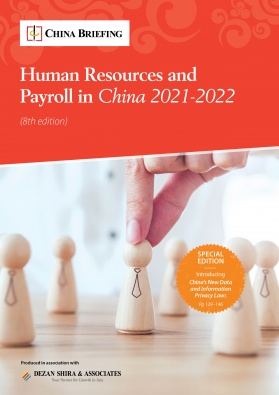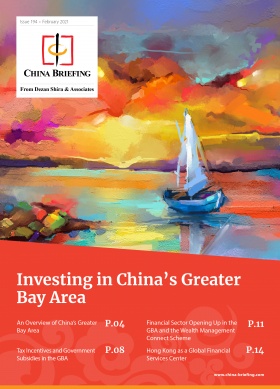China’s Regulatory Plans for Technology Companies and the Platform Economy in 2022
New government document reveals the trajectory of China’s regulatory plans for technology companies in 2022 – targeting antitrust, data and algorithm security, fintech regulation, and gig workers’ rights, among other areas. Companies operating in this domain or whose businesses depend on digital platforms are advised to pay close attention to their compliances and risk exposure. Also to be noted is the fact that sector regulatory guidelines are being continuously developed by authorities.
On January 19, 2021, nine Chinese ministries and commissions jointly issued the Opinions on Promoting Standardized, Healthy, and Sustainable Development of Platform Economy (Fa Gai Gao Ji [2021] No.1872) (hereafter the “Opinions”).
The Opinions, addressed to all local governments, reaffirm Beijing’s commitment to regulate monopolies, unfair competition, user data abuse, and other outlawed behaviors of platform companies. They also promise stronger supervision over advertising, tax reporting, and labor rights protection in the online platform sector.
While clarifying the responsibilities of platform companies, the Opinions clearly state Beijing’s support for technological innovation and overseas market expansion of domestic platform companies.
Rationale behind the spate of tech regulation
China’s platform economy has been experiencing an explosive expansion in recent years. The country’s tech giants, especially Alibaba and Tencent, are rapidly increasing their influence over every aspect of Chinese people’s life, from online shopping, payments, chatting, ride-hailing, to food delivery.
After years of tolerating tech companies abusing monopolistic privileges, massively collecting personal data and abusing its access, and recklessly moving capital into the unregulated fintech market, last year, Chinese authorities rolled out a deluge of laws and regulations targeting various aspects of the tech sector.
Beijing is now determined to update its laws and regulatory system to fight corporate monopolies, champion consumer rights and data privacy, and stamp down financial risks. By limiting China’s internet titans, the policymakers hope to level the regulatory playing fields for upstart innovative tech firms. Moreover, top leaders also wish internet companies would wade into “hard tech” R&D to help China achieve the country’s strategic objectives.
How China intends to regulate its technology industry in 2022
Anti-monopoly and anti-unfair competition
China will continue to revise the Anti-Monopoly Law, formulate rules to prohibit unfair competition online, and investigate monopoly agreements, abuses of market dominance, and concentration of undertakings, the Opinions say.
Some context: China has taken a series of actions against monopolistic and anti-competitive practices of internet titans in 2021. From December 2020 to April 2021, regulators fined over a dozen of tech companies, including Alibaba, Tencent, and Baidu, for failing to seek anti-monopoly approval for internet M&As, abusing market dominance, or forcing vendors or merchants to pick sides (namely choosing between their services and those of their rivals). The country also speeded up the pace of legislation. In February 2021, the top market regulator issued new anti-monopoly guidelines for platform economy to stop monopolistic behaviors of platform companies. In November 2021, the closely watched draft amendment to the Anti-Monopoly Law was submitted to the country’s legislative body for initial review and disclosed to the public for comments. The draft amendment stipulated that business operators should not exclude or limit market competition by abusing data, algorithms, technology, capital advantages, and platform rules. That month, the top market regulator also elevated the position of its anti-monopoly investigative unit.
Data and algorithm security
China will develop the accompanying regulations for the Data Security Law (DSL) and Personal Information Protection Law (PIPL), refine the data processing rules for platform companies, establish a supervision system with “graded classification + negative list” for cross-border data flow, and explore an algorithm security system for Internet information services.
The Opinions call for enhancing regulatory scrutiny over platform companies collecting extra personal information beyond the prescribed scope or using personal information beyond their rights, as well as curbing data abuses, including black market data transaction and big data discriminatory pricing against customers.
Some context: China’s sweeping data-related laws, the DSL and PIPL tool effect from September 1, 2021 and November 1, 2021 respectively. However, the current legal framework for data regulation is far from mature. Rules remain to be clarified over data classification, data transactions, cybersecurity and data security review process, among others. For many foreign investors, data accessibility issues may last until regulations and rules are finalized. Nevertheless, China has begun cracking down on personal data violations and abuses. In the period between May and October of 2021, over 1,862 mobile apps were warned and 643 of them (34.5 percent) were delisted from the app store for their infringement of users’ rights. At the same time, China has embarked on developing a national data market. Experimental projects include Shanghai Data Exchange launched at the end of 2021, open government data sharing, and cross-border data exchange centers.
The Opinions support the role of third-party institutions to evaluate tech companies’ algorithms for data and algorithm compliances. This, however, should be done in an accountable manner – that is, the premise is that these third-party institutions do not disclose the commercial secrets of the companies whose algorithm data they audit.
Local governments should guide platform companies to improve the transparency, interpretability, and fairness of their algorithms. Companies should not use algorithms to falsify information content, disseminate harmful information or vulgar content, hijack traffic, or register fake accounts.
Some context: in January 2022, China passed a new set of regulations that rein in the use and misuse of recommendation algorithms. The regulations demand more transparency over how the algorithms function and give users more control over which data companies can use to feed algorithms.
In addition, the Opinions ask local governments to push platform enterprises to implement network security level protection system, explore ad carry out data security risk monitoring and reporting mechanism, and establish an emergency response system.
Financial services and investment activities
China plans to rein in the financial activities and business of platform enterprises, to prevent the “unbridled expansion of capital.”
For the first time, the Opinions propose to strictly regulate platform companies’ investment in financial institutions and local financial organizations. It urges platform companies and financial institutions controlled or backed by them to strictly implement the country’s requirements for capital and leverage ratios.
Some context: In April 2021, China’s top financial authorities summoned over a dozen of tech companies engaging in financial business, including Ant Group (a spinoff from Alibaba Group that groups together its financial services operations), Tencent, Duxiaoman Finance (Baidu’s fintech arm), Jingdong Finance (JD.com’s fintech arm), ByteDance, and Meituan. Most of these platform companies had invested in multiple financial institutions. These companies were asked to overhaul their fintech operations to ensure all their financial activities are regulated and all their financial businesses are properly licensed.
In terms of payment businesses, the Opinions ask companies to cut off “improper links” between their payment services and their financial products. Companies should not use picking-sides practice in the payment services or abuse the market dominance of non-bank payment services. The Opinions also propose to introduce a non-bank payment institution ordinance.
Some context: In April 2021, Ant Group was ordered to rectify its businesses and scrap its record IPO. The owner of Alipay was required to remove and delink the Huabei and Jiebei lending products from its ubiquitous payment platform. Before, the company was criticized for using the payment platform as a port of entry to lure users into more lucrative financial services, such as consumer lending.
In the field of credit business, the Opinions aim to standardize the use of platform data, strictly supervise the credit-reporting business, and ensure legal and compliance operations.
To rein in fintech firms that are recognized as a financial holding companies (FHC), the government is considering an FHC supervision system and stricter scrutiny of shareholders and transactions between connected parties.
To protect consumers, the government also plans to improve the consumer protection mechanism and strengthen the supervision of marketing behaviors to ensure that the information disclosed by these companies is true and accurate and does not induce excessive consumption.
Other suggestions
Furthermore, the Opinions propose to strengthen supervision of advertising in key areas and focus on regulating activities, such as misleading consumers by low-quality products, failing to review the market access qualifications of sold products, and failing to urge merchants to recall defective consumer goods etc.
The Opinions also call on local authorities to strengthen supervision of platform companies’ tax obligations, investigate and punish tax-related violations, such as false invoicing and tax evasion, and strengthen the management and supervision of platform deposit, prepayment, security deposit, and other expenses.
At the same time, the Opinions encourage domestic platform companies to “go out” and expand to overseas markets. The document says relevant government departments should help platform enterprises to develop cross-border e-commerce, promote the construction of overseas warehouses, and help small and medium-sized enterprises (SMEs) to leverage cross-border e-commerce platforms to expand their businesses.
Key points for foreign companies in the tech industry
The informative Opinions indicate China’s regulatory and incentive policies will cover almost every aspect of online platform businesses.
To sum up, it can be sure that based on the policies from 2021, the Chinese government will continue to curb market concentration, punish personal data infringement and data abuses, bring fintech business under financial regulatory purview, and push platform companies to protect gig workers’ labor rights and interests.
Parallel to these directives – China’s policymakers also wish to leverage online platforms to boost domestic consumption, expand foreign trade, stimulate the wider economic growth potential.
Looking forward, foreign investment in China’s tech companies will get more complicated. For international corporations, accessing corporate data from China can become difficult in the near term. Foreign companies running platforms or apps in China must be more vigilant when collecting and using personal information amid a tighter regulatory environment.
About Us
China Briefing is written and produced by Dezan Shira & Associates. The practice assists foreign investors into China and has done so since 1992 through offices in Beijing, Tianjin, Dalian, Qingdao, Shanghai, Hangzhou, Ningbo, Suzhou, Guangzhou, Dongguan, Zhongshan, Shenzhen, and Hong Kong. Please contact the firm for assistance in China at china@dezshira.com.
Dezan Shira & Associates has offices in Vietnam, Indonesia, Singapore, United States, Germany, Italy, India, and Russia, in addition to our trade research facilities along the Belt & Road Initiative. We also have partner firms assisting foreign investors in The Philippines, Malaysia, Thailand, Bangladesh.
- Previous Article China’s Most Productive Provinces and Cities as per 2021 GDP Statistics
- Next Article Understanding China’s New Rules on Import and Export Food Safety








